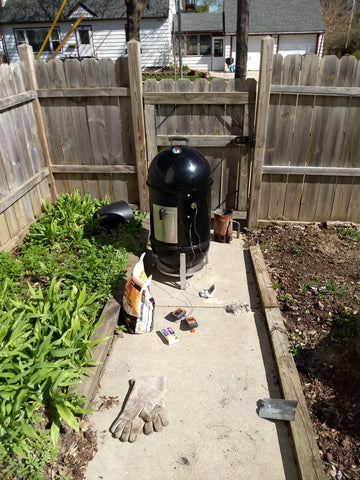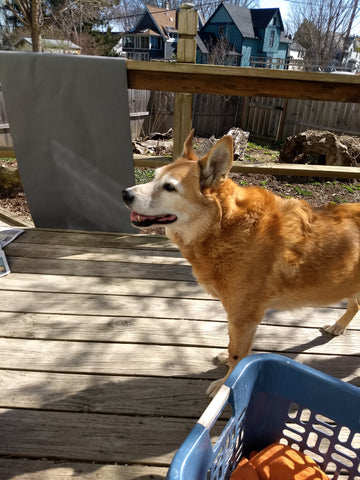Brew Day #1 - American IPA May 18 2020, 0 Comments
I lucked out. Brew day #1 was a beautiful, 60F, sunny day. Not only did I make an IPA, but I had a brisket in the smoker for the first cook of the spring!

I knew my first brew would present some challenges. First time brewing in 2020, first time brewing on my new system, and first time making an all-grain gluten-free batch. That's a lot of firsts! And wouldn't you know it, the brew day did in fact live up to the billing by throwing me a few curveballs. But first, let's talk about the recipe.
The Recipe
After some consultation with my buddy Steven, who used to work at the Shop and now brews at Alt Brewing, Madison's dynamite GF brewery, here's what I came up with for a recipe:
- 10 lb Pale Millet Malt - Looking for a base to add gravity, some body, sweetness, and color
- 2 lb Munich Millet Malt - Looking for a bready, toasty, malty flavor
- 2 lb Goldfinch Millet Malt - Looking for a toasty and caramel flavor
- 1.5 lb Crystal 50L Millet Malt - Looking for some sweetness, body, and mouthfeel
- 2 lb Rice Hulls - Used to prevent stuck sparge
- 2 lb Rice Syrup Solids (in boil) - Looking for increased starting gravity
- 2 oz Chinook pellets (.9 oz @ 60 min, .1 oz in whirlpool, 1 oz dry hop)
- 1 oz Simcoe pellets (whirlpool)
- 2 oz Amarillo pellets (1 oz whirlpool, 1 oz dry hop)
- 1 oz Columbus pellets (whirlpool)
- 2 oz Centennial (dry hop)
- US-05 dry yeast
- 1/2 tsp Wyeast Beer Yeast Nutrient (@ 10 min)
- 1 tsp Irish Moss (@ 10 min)
Madison has pretty hard water, so i made the following adjustments to my brewing water:
- 67% tap water, 33% reverse osmosis water
- Used 1/2 campden tablet to de-chlorinate the tap water
- Added 1/2 tsp amylase enzyme to mash to increase conversion
- Added 1/2 tsp gypsum to the boil to help accentuate hop bitterness
The Mash
I was shooting for a 90 minute mash at 161F. I used an online calculator to calculate my strike water temperature. This is where my brew day first started to stray from the plan. Which is funny, because it was pretty much the first part of the brew day :)
After filling up my mash tun with 180F water and then stirring in my grain, my mash temp was a full 10F below what I was shooting for. So I ended up having to put in around 1.5 gallons of hot water to bring the mash up to 160. Which was actually ok, because my mash would have been much too thick otherwise.
I took a pH reading after mashing for around 10 minutes, and got a reading of 5.1. I was happy with this level, so I did not do any further adjustments (except for the gypsum in the boil).
So after 90 minutes of mashing, I performed a conversion test with iodine. It showed that the starches had been converted (yea!), so it was time to lauter and sparge. I batch sparged at 170F with 3.25 gallons. I had a real difficult time getting the filter bed to set during the sparge, so more grain chunks got transferred over to the boil than I would have cared for. Also, because I didn't want to reduce the amount of sparge water, I went into the boil kettle with an extra gallon or so of wort.
The Boil
Because the initial boil level was high, I lengthened my boil from 60 minutes to about 110 minutes. I got a little more color and more carmelization that I was shooting for, but I think that is a worthwhile trade-off to achieve the gravity I was looking for.
After about 50 minutes, I added 1 lb Rice Syrup Solids and took a refractometer reading and got a gravity of 1.044, which was my target pre-boil gravity, so I started the 60 minutes timer and added .9 oz of Chinook hops. Because I was at my target gravity, I did not add the second pound of Rice Syrup Solids. The boil went about as smoothly as you could ask for. The only real excitement was the fact that I was running out of propane, and probably had about 2 minutes of cook time left when I shut-off the heat. Thanks homebrewing gods!
Post-Boil
I had planned on whirlpooling the hops at 170F for about 25 minutes. However, I was quite surprised how quickly the temperature dropped, especially when I was recirculating. By the time I took a temperature reading, it was down to 155F. So I whirlpooled there for 45 minutes, which means I'll get a little less bitterness, but should retain more of the volatile hops oils.
Once the whirlpool was completed, I cooled the wort down to 70F, filled the fermenter, and added the US-05 dry yeast. I was shooting for going into the fermenter with 5.25 gallons, but only ended up with about 4.5 gallons. My target gravity was 1.056, and the actual gravity was 1.053, so I'm pretty happy with that.
Lessons Learned
Lots! Ok, perhaps I should be a little more specific:
- The millet soaked up more water than I was anticipating. I'll definitely have to put more water in the mash to thin out the mash and maybe remove a little bit from the sparge so I don't go into the kettle with too much volume.
- My temperature calculation for my strike temperature was low, need to get that corrected.
- I'll give batch sparging another try, but I hope to find a better way to have the grain filter bed re-form. Perhaps just a little patience, as the great Axl Rose would say?
- Make sure to check the propane tanks before the brew :)
- I may install a thermometer in the boil kettle to more easily hit the target whirlpool temperature (I plan on making lots of hoppy beer!)
- Create a "dip stick" with volume markers for the boil kettle so readings can be more accurate.
- I was pretty impressed with how powerful the burner was.
- I can't wait to try this beer, it tasted sweet and hoppy going into the fermenter.
- The brisket, while good, could probably have used another 45-60 minutes on the pit.
- My beautiful, sweet, old dog enjoyed her last brew day with her papa. RIP Buck Jones :(

See you next time with a wrap-up of how fermentation, dry hopping, packaging, and consuming went. And I'll preview brew number two! Until then, happy (gluten-free) homebrewing!
